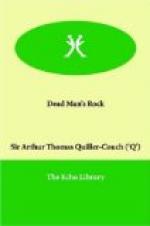“I said farewell to the captain of the Golden Wave and my friend Colliver upon the quay, meaning to ask Mr. Sanderson to recommend a good lodging for the short time I intended to stay in Bombay. Captain Carey had already directed me to the East India Company’s office, and hither I tried to make my way at once. Easy as it was, however, I missed it, being lost in admiration of the crowd. When at last I arrived at the doors I was surprised to see Colliver coming out, until I remembered that his brother was in the Company’s employ. It seems, however, that he had been transferred to Trichinopoly some months before, and my friend’s labour was in vain. I am bound to say that he took his disappointment with great good-humour, and made very merry over our meeting again so soon, protesting that for the future we had better hunt in couples among this outlandish folk; and so I lost him again.
“After some difficulty and delay I found myself at length in the presence of this Mr. Elihu Sanderson, on whom I had speculated so often. I was ushered by a clerk into his private office, and as he rose to meet me, judged him directly to be the son of the Elihu Sanderson mentioned in my father’s Will—as indeed is the case. A spare, dry, shrivelled man, with a mouth full of determination and acuteness, and a habit of measuring his words as though they were for sale, he is in everything but height the essence of every Scotchman I remember to have seen.
“‘Good day,’ said he, ‘Mr.—I fancy I did not catch your name.’
“‘Trenoweth,’ said I.
“‘Indeed! Trenoweth!’ he repeated, and I fancy I saw a glimmer of surprise in his eyes. ‘Do I guess your business?’
“‘Maybe you do,’ I replied, ‘for I take it to be somewhat unusual.’
“’Ah, yes; just so; somewhat unusual!’—and he chuckled drily— ’somewhat unusual! Very good indeed! I suppose—eh?—you have some credentials—some proof that you really are called Trenoweth?’—Here Mr. Sanderson looked at me sharply.
“In reply I produced my father’s Will and the little Bible from my jersey’s side. As I did so, I felt the Scotchman’s eyes examining me narrowly. I handed him the packet. The Will he read with great attention, glanced at the Bible, pondered awhile, and then said—
“’I suppose you guess that this was a piece of private business between Amos Trenoweth, deceased, and my father, also deceased. I tell ye frankly, Mr. Trenoweth—by the way, what is your Christian name, eh? So you are the Ezekiel mentioned in the Will? Are you a bold man, eh? Well, you look it, at any rate. As I was saying, I tell ye frankly it is not the sort of business I would have undertaken myself. But my father had his crotchets—which is odd, as I’m supposed to resemble him—he had his crotchets, and among them was an affection for your father. It may have been based on profit, for your father, Mr. Trenoweth, as far as I have heard, was not exactly a lovable man, if ye’ll excuse me. If it was, I’ve never seen those profits, and I’ve examined my father’s papers pretty thoroughly. But this is a family matter, and had better not be discussed in office hours. Can you dine with me this evening?’




